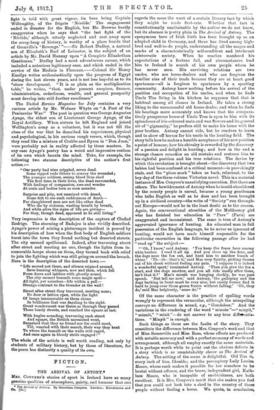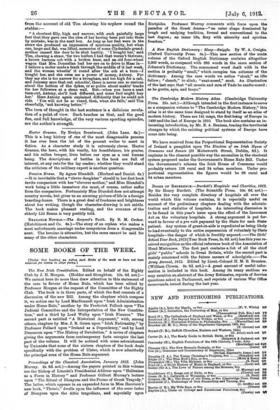FICTION.
itm ARRIVAL OF ANTONY.•
Has. CONYERS'S stories of sport in Ireland have so many genuine qualities of atmosphere, gaiety, and humour that one
• Tits Arrival of Antony. By Dorothea Conyers. London : Hutchinson and Ca res.]
regrets the more the want of a certain literary tact by which they might be made first-rate. Whether that tact is constitutionally unattainable by the author we do not know, but its absence is pretty plain in The Arrival of Antony. The
eponymous hero of Irish birth has been brought up as an adopted child in Germany, and there has lived among high- bred and well-to-do people, understanding all the usages and marks of a characteristically self-confident and intolerant aristocratic society. When he reaches manhood his
expectations of a fortune fail, and circumstances lead him to Ireland in search of his own people whom he
has never seen. His surviving relations are two uncles, who are horse-dealers and who are forgiven the familiar sins of their trade because they are at heart good sportsmen—all is forgiven to sportsmen by a sporting community. Antony knew nothing before his arrival of the position and occupation of his uncles, and when be finds Uncle Tim living in his kitchen he supposes that that is habitual among all classes in Ireland. He takes a strong liking to the unsuccessful old horse-dealer, and when he finds his bearings more accurately and knows that the compara- tively prosperous house of Uncle Tom is open to him with its splendours of iris-coloured mats and wax flowers and its general air of " gigmanity," he prefers still to make his home with the poor brother. Antony cannot ride, but he resolves to learn and to show off horses for his uncle in the hunting field. The story tells how he makes a humble acceptance of his new position a point of honour; how his chivalry is rewarded by the discovery
of a passion and delight in hunting ; and how in the end a strange chance remedies an old mistake and restores him to his rightful position and his true relations. The device by which this revolution is brought about—the discovery that two
babies had been confused at a critical moment—is provokingly stale, and the "plum mark " takes us back, reluctant, to the hey-day of the three-volume Victorian novel. This is a material instance of Mrs. Conyers's unsatisfying execution. But there are others. The bewilderment of Antony when he is cold-shouldered by the county people is unreal, because a young gentleman who talks English as well as be does and has been brought up in a civilized country—the writs of "Society" run through. out Europe—would not be in the least doubt as to the reason.
Again, the conversational atrocities of the Muldooney girl who has finished her education in "Pars" (Paris) are exaggerated and inconsistent. The same is true of Antony's aggravated ignorance of hunting. An educated man in full possession of the English language, be he never so ignorant of hunting, would not have made himself responsible for the
particular enormities in the following passage after he had " read up " the subject :—
"‘ Oh, I know,' said Antony. 'You keep the foxes here among whin bushes. I read it all up. And you close up the dens, and the dogs nose the fox out, and hunt him to another bunch of whin.' Th—th—that's it,' said Mac very faintly, picking thorns out of his cheek without feeling any pain. I suppose it is indeed a wonderful sport,' ruminated Antony. 'Then you give the fox a start, and the dogs another, and you all ride madly after them, isn't that it ?' Mac's mouth was hanging slackly, he was past speech. 'But tell me now,' said Antony, the galloping and the dogs barking in front must be very nice, but surely horses find it hard to jump over those green fences without falling.' Oh, they do,' said Mac helplessly, some do.' " Of the same character is the practice of spelling words wrongly to represent the vernacular, although the misspelling conveys no difference in sound, e.g., " Gondoleer." And the variations in the rendering of the word " minute "—" minyit,"
" minyit," " minit "—do not answer to any true diffeeentia. " Minyit " is enough.
Such things as these are the faults of the story. They
constitute the difference between Mrs. Conyers's work and that of Miss Somerville and Miss Rosa, whose effects are produced with notable accuracy and with a perfect economy of words and
arrangement, although all employ exactly the same materials. It is perhaps worth while to point out the obvious defects in a story which is so unmistakably clever as The Arrival of Antony. The setting of the scene is delightfal. Old Tim is, every inch of him, likeable; and the peremptory Lady Louisa Moore, whose rank makes it possible for her somehow to be brutal without offence, and the brave, independent girl, Kath.
leen Moore, who is incapable of snobbishness, are both excellent. It is Mrs. Conyers's merit that she makes you feel that you could not look into a shed in the country of these people without finding a horse. We quote, in conclusion,
from the account of old Tim showing his nephew round the stables :- " A chestnut filly, high and narrow, with such painfully large feet that they gave one the idea of her having been put into them by mistake, was in the next box. As long as her feet were in the straw she produced an impression of spurious quality, but when one, large and flat, was lifted, memories of some Clydesdale grand-
mother caused the door to be shut hastily. bought her,' said Tim, chewing a straw, 'for two heifers I had that weren't thrivers ; a brown harness cob with a broken knee, and an old four-wheel wagon that Mrs. Donnellan had her eye on to drive to Mass in— I believe a motor made a track through the middle of it last week, and the woman wheelin' it round after the cob at a turn—I bought her, and she owes me a power of money, Antony. For they say she is too narrow for a brougham, and too high for a cab, and Jamesey says that out schoolin', there is never one so curious about the bottom of the dykes, or so polite about makin' tracks for her followers at a stone wall. But—when you have a neat turn-out, Antony, she'll look different, and some fool might buy her.' Here Antony again explained diffidently that he could not ride. Yon will not be so vexed, then, when she falls,' said Tim cheerfully, 'not knowing better.' "
The torn of thought in the last sentence is a delicious revela- tion of a point of view. Such touches as that, and the good fun, and full knowledge, of the very various sporting episodes, are the author's strength.



















































 Previous page
Previous page